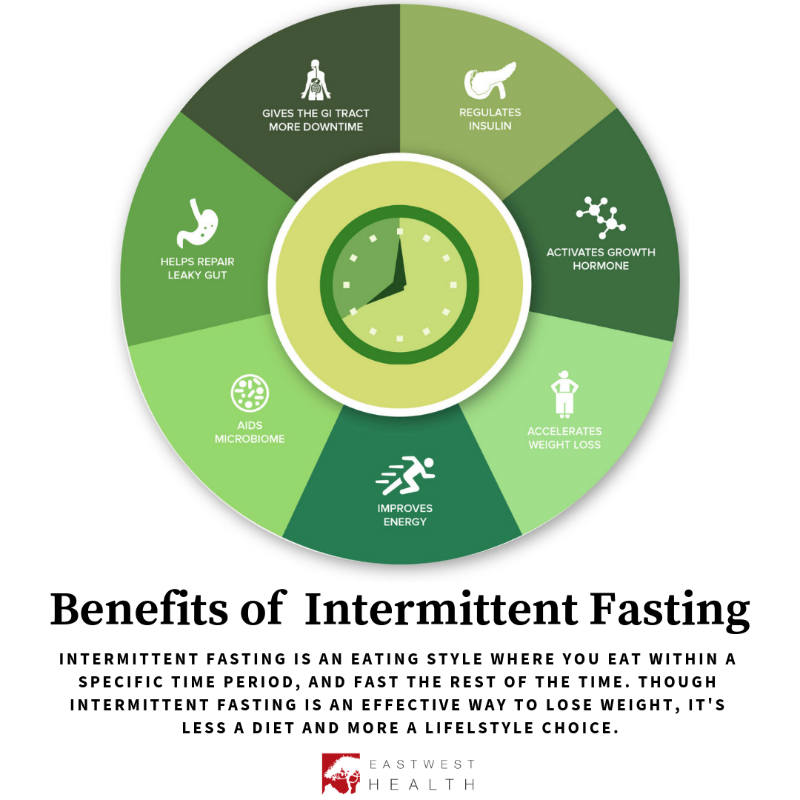East West Health’s medical provider, Cami Gillett, LAc, wanted to talk a little about intermittent fasting. Here’s what she had to say:
Intermittent fasting is a diet designed to influence weight loss by causing mild stress on the body by fasting for up to 12 hours at a time. Research shows that this style of fasting gives the body time to clear out inflammation, completely digest that day’s food, and promote a healthy gut microbiome.
Water, coffee, and tea are fine to consume during intermittent fasting times. Most people find it easiest to stop eating after dinner (no more evening snacks!), sleep eight hours then only consume water in the morning until their goal fasting time is up. For example, if you finish dinner at 7pm and go to bed at 9pm, you wake up at 6am, you only have one hour to wait until breakfast for a 12 hour fasting period.
A healthy array of foods are recommended during the eating hours, and our health coach at East West Health can help each individual figure out what will produce the best results as well as how to make them tasty and enjoyable!

How Intermittent Fasting Can Help Your Health
Intermittent Fasting Induces Various Cellular Repair Processes
When the body is in fasting, the cells initiate a cellular “waste removal” process called autophagy. Autophagy is when the cells break down and metabolize the broken and dysfunctional proteins that build up in the cells over time. In fact, increased autophagy may provide protection against several diseases, including cancer and Alzheimer’s disease. (reference, reference)
Intermittent Fasting is Good For Your Brain
It’s pretty common that the things that are good for the body are good for the brain. Intermittent fasting improves a variety of metabolic features that have known to be important for brain health. This can include a reduction in oxidative stress, reduction of inflammation and a reduction in blood sugar levels in insulin resistance. There have been several studies in rats that have shown that intermittent fasting might increase the growth of new nerve cells, which can have benefits for brain function. (reference, reference)
Intermittent fasting also increases the levels of a brain hormone called brain-derived neurotrophic factor (BDNF). A deficiency of this hormone has been implicated in depression and various other brain problems. (reference, reference)
The most common neurodegenerative disease is Alzheimer’s disease. There is currently no cure for the degenerative disease, which means preventing it from showing up in the first place is crucial. A study in rats showed that intermittent fasting might delay the onset of Alzheimer’s or reduce its severity. (reference)
Intermittent Fasting May Extend Your Lifespan, Helping You Live Longer
Who doesn’t want to improve their health so they can live longer? Intermittent fasting might be able to do this! Studies in rats have shown that intermittent fasting extends lifespan in a similar way as continuous calorie restriction. (reference) In one of the studies, the rats that fasted every other day lived 83 percent longer than the rats that did not fast. (reference) While this study is exciting, it’s far from being proven in humans yet, still intermittent fasting has become very popular among the anti-aging crowd. Due to the known benefits for metabolism and other health markers, it makes sense that intermittent fasting could, in fact, help you live a longer and healthier life.
To talk with one of our health coaches and learn more about how we can help you recharge your health, give us a call!
